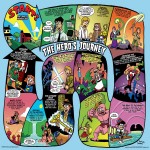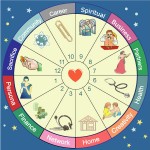 When you’ve seen as many movies as I have, you begin to see that they all follow a certain pattern. This is true not just of movies, but of all great stories ranging from those found in classic mythology and literature to modern TV series and video games. Joseph Campbell called it the monomyth or hero’s journey. It’s basically a series of steps that the protagonist must go through during the course of his or her adventure. In addition to this, there are also a number of spiritual principles that often find their way into storytelling. By combining these principles with the monomyth, you can pretty much figure out where just about any story is headed. While this skill has proven to be incredibly annoying to my wife, it’s come in very handy for me. Not because I’ve continually annoyed her with my usually correct movie and TV show predictions, but because I’ve noticed that these storytelling rules apply to more than just fictitious stories. They also apply to real life.
When you’ve seen as many movies as I have, you begin to see that they all follow a certain pattern. This is true not just of movies, but of all great stories ranging from those found in classic mythology and literature to modern TV series and video games. Joseph Campbell called it the monomyth or hero’s journey. It’s basically a series of steps that the protagonist must go through during the course of his or her adventure. In addition to this, there are also a number of spiritual principles that often find their way into storytelling. By combining these principles with the monomyth, you can pretty much figure out where just about any story is headed. While this skill has proven to be incredibly annoying to my wife, it’s come in very handy for me. Not because I’ve continually annoyed her with my usually correct movie and TV show predictions, but because I’ve noticed that these storytelling rules apply to more than just fictitious stories. They also apply to real life.
 For years leading up to 2012, spiritual-types who were sick of the way the world was heading could take comfort in the promise of a new era that was predicted to begin on December 21 of that year. The Mayans, known for their astronomical expertise had supposedly predicted it. In addition, St. Malachy’s famous Prophecy of the Popes, which predicts when the world as we know it would end, also correlates to about the same time period. The Hopi tribe, Edgar Cayce, a book attributed to Nostradamus, hell, even The History Channel’s countless specials all pointed towards 12/21/12 as the beginning of the end times. The details differed, but whether you believed that Earth was due for a major cataclysm, a spiritual awakening, a religious reckoning and rapture, an alien visitation, a new dimension, or just an enlightened age, most people seemed somewhat excited that a major event was on the horizon. When the day finally arrived, we instead got something that came as a shock to many: absolutely nothing. Or so it would seem.
For years leading up to 2012, spiritual-types who were sick of the way the world was heading could take comfort in the promise of a new era that was predicted to begin on December 21 of that year. The Mayans, known for their astronomical expertise had supposedly predicted it. In addition, St. Malachy’s famous Prophecy of the Popes, which predicts when the world as we know it would end, also correlates to about the same time period. The Hopi tribe, Edgar Cayce, a book attributed to Nostradamus, hell, even The History Channel’s countless specials all pointed towards 12/21/12 as the beginning of the end times. The details differed, but whether you believed that Earth was due for a major cataclysm, a spiritual awakening, a religious reckoning and rapture, an alien visitation, a new dimension, or just an enlightened age, most people seemed somewhat excited that a major event was on the horizon. When the day finally arrived, we instead got something that came as a shock to many: absolutely nothing. Or so it would seem.
 Ever since Darwin published his infamous On the Origin of the Species in 1859, science and theology have been at war over the theory of evolution. The irony is that evolution and all its aspects—natural selection, survival of the fittest, genetic mutations—all appear in the Bible as clear as day. In fact, even the missing link of the explanation that science has still not uncovered appears in there as well. Is it found in some lost book, obscure passage, cryptic verse, or esoteric translation? No, it appears in an entire story that everyone knows—the story of Noah’s Ark. And once I point out the metaphoric meaning of the story, you’ll wonder how on earth you never noticed it before. How? The church didn’t want you to notice. Because the truth takes power away from them and puts it where it rightfully belongs—to you.
Ever since Darwin published his infamous On the Origin of the Species in 1859, science and theology have been at war over the theory of evolution. The irony is that evolution and all its aspects—natural selection, survival of the fittest, genetic mutations—all appear in the Bible as clear as day. In fact, even the missing link of the explanation that science has still not uncovered appears in there as well. Is it found in some lost book, obscure passage, cryptic verse, or esoteric translation? No, it appears in an entire story that everyone knows—the story of Noah’s Ark. And once I point out the metaphoric meaning of the story, you’ll wonder how on earth you never noticed it before. How? The church didn’t want you to notice. Because the truth takes power away from them and puts it where it rightfully belongs—to you.
 When I was a kid, someone pointed out that the shape of the inside of your ear was similar to the shape of how you looked as a fetus. At the time, I chalked it up to one of those fantastical things kids say to exaggerate a correlation. But years later in advertising school, one of my professors had us gather the leaves from a lemon tree and then look at how it compared to the shape of the tree itself. Amazingly, the veins of the leaf seemed to match the branches of the tree, and the leaf’s shape was similar to the tree’s overall shape. Could it be possible that the parts of a living object represent the whole? And if so, how far back could we go to see similarities of ourselves as a society—to the lines in our palms, the DNA in our genes, or even the atoms in our bodies?
When I was a kid, someone pointed out that the shape of the inside of your ear was similar to the shape of how you looked as a fetus. At the time, I chalked it up to one of those fantastical things kids say to exaggerate a correlation. But years later in advertising school, one of my professors had us gather the leaves from a lemon tree and then look at how it compared to the shape of the tree itself. Amazingly, the veins of the leaf seemed to match the branches of the tree, and the leaf’s shape was similar to the tree’s overall shape. Could it be possible that the parts of a living object represent the whole? And if so, how far back could we go to see similarities of ourselves as a society—to the lines in our palms, the DNA in our genes, or even the atoms in our bodies?
 Supposedly, nobody ever said life was fair. Well, I’m saying it right now. Maybe I’m a nobody so the adage still works but I’ve come to believe that life is absolutely fair. Yes, there are selfish jerks who seem to be rewarded while truly good, hardworking, selfless people seem to be punished. There are people who’ve lived like there’s no tomorrow that live long, healthy lives while people who ate healthy, exercised and did everything right have died young. There are innocent children who suffer with terminal illness while evil dictators enjoy the good life. So how is it that I can possibly believe that life is fair? Because most people only see life on a superficial level, but it’s time that we dig a little deeper.
Supposedly, nobody ever said life was fair. Well, I’m saying it right now. Maybe I’m a nobody so the adage still works but I’ve come to believe that life is absolutely fair. Yes, there are selfish jerks who seem to be rewarded while truly good, hardworking, selfless people seem to be punished. There are people who’ve lived like there’s no tomorrow that live long, healthy lives while people who ate healthy, exercised and did everything right have died young. There are innocent children who suffer with terminal illness while evil dictators enjoy the good life. So how is it that I can possibly believe that life is fair? Because most people only see life on a superficial level, but it’s time that we dig a little deeper.
 You’ve seen it hundreds of times. Some guy is being interviewed by the local news after he helped prevent some crime or rescued someone in distress. The reporter asks, “Do you consider yourself a hero?” Apparently, this question must be asked in order to test whether or not said person is in fact a hero. According to local news rules of heroism, the man is only a hero, if and only if, he claims to not be one. Most people, knowing this rule, go on to say that they don’t consider themselves to be a hero because they just did what anyone in their situation would’ve done. The reporter then cuts back to the anchorpeople who disagree with the man’s assessment. Feeling that the hero test was passed, they comment about what a true hero the man is while a colorful “local hero” graphic displays besides them. Personally though, I agree with the guy. He’s not a hero.
You’ve seen it hundreds of times. Some guy is being interviewed by the local news after he helped prevent some crime or rescued someone in distress. The reporter asks, “Do you consider yourself a hero?” Apparently, this question must be asked in order to test whether or not said person is in fact a hero. According to local news rules of heroism, the man is only a hero, if and only if, he claims to not be one. Most people, knowing this rule, go on to say that they don’t consider themselves to be a hero because they just did what anyone in their situation would’ve done. The reporter then cuts back to the anchorpeople who disagree with the man’s assessment. Feeling that the hero test was passed, they comment about what a true hero the man is while a colorful “local hero” graphic displays besides them. Personally though, I agree with the guy. He’s not a hero.
 Those who move in spiritual circles often talk about how we are all connected, that our thoughts create our future reality, and that the universe provides us with clues about our direction in life. Personally, I look at spiritual principles as scientific rules that we just don’t understand yet. Not too long ago, the idea that people could get sick from tiny bugs they couldn’t see or that invisible waves could carry images or music was thought to be magical thinking, until science proved it to be true. So if these spiritual principles are indeed a rule of our universe, there should be a way to test and predict their occurrence. Doing this on an individual scale might prove challenging though, since one person’s thoughts may not have enough energy to make something manifest in a testable way. But what if there were an event that millions of people were focusing on, and this event inspired heated, emotionally charged thoughts that could result in only one of two possible outcomes? If only we had such an event, why, we just might be able to predict the future on a grand scale!
Those who move in spiritual circles often talk about how we are all connected, that our thoughts create our future reality, and that the universe provides us with clues about our direction in life. Personally, I look at spiritual principles as scientific rules that we just don’t understand yet. Not too long ago, the idea that people could get sick from tiny bugs they couldn’t see or that invisible waves could carry images or music was thought to be magical thinking, until science proved it to be true. So if these spiritual principles are indeed a rule of our universe, there should be a way to test and predict their occurrence. Doing this on an individual scale might prove challenging though, since one person’s thoughts may not have enough energy to make something manifest in a testable way. But what if there were an event that millions of people were focusing on, and this event inspired heated, emotionally charged thoughts that could result in only one of two possible outcomes? If only we had such an event, why, we just might be able to predict the future on a grand scale!
 There is certainly no shortage of theories about what may or may not happen on December 21. Of course, nearly all of them will turn out to be wrong. My experience has shown however, that there is one thing you can do that will likely be beneficial regardless of what’s in store for us: think positive.
There is certainly no shortage of theories about what may or may not happen on December 21. Of course, nearly all of them will turn out to be wrong. My experience has shown however, that there is one thing you can do that will likely be beneficial regardless of what’s in store for us: think positive.
 Let me guess, you don’t have time to read this right now, do you? Yes, the holiday season is always busy and yes time seems to go faster as you get older but doesn’t life seem to be moving at an even more frantic pace than usual lately? I know I’m feeling it. But I’ve been expecting this time crunch for a while now, so it may be a bit easier for me to deal with. Since I tend to be pretty sensitive about this stuff, what I wasn’t sure about was whether others would be able to pick up on it too. In the last few weeks however, I’ve heard at least fifteen different people exclaim in near shock about how fast time’s been going lately. And this without my even bringing it up! So, what’s going on? Can time really be going faster? If so, how much faster can it go before we can no longer keep up? And what then? Are we literally running out of time?
Let me guess, you don’t have time to read this right now, do you? Yes, the holiday season is always busy and yes time seems to go faster as you get older but doesn’t life seem to be moving at an even more frantic pace than usual lately? I know I’m feeling it. But I’ve been expecting this time crunch for a while now, so it may be a bit easier for me to deal with. Since I tend to be pretty sensitive about this stuff, what I wasn’t sure about was whether others would be able to pick up on it too. In the last few weeks however, I’ve heard at least fifteen different people exclaim in near shock about how fast time’s been going lately. And this without my even bringing it up! So, what’s going on? Can time really be going faster? If so, how much faster can it go before we can no longer keep up? And what then? Are we literally running out of time?
 Have you been feeling a bit dizzy lately? Does time feel like it’s been flying by faster than ever? Experiencing ringing in your ears? Seeing flashes of light or fleeting glimpses of things that aren’t there? If you’re not head-over heels in love, pregnant, or smokin’ da ganja, you may be going through what’s known as ascension symptoms. What are they, why are they happening, what do they mean, and will they ever go away? If you’d like answers to questions like these, the latest installment of Layman just might be the prescription you’ve been looking for.
Have you been feeling a bit dizzy lately? Does time feel like it’s been flying by faster than ever? Experiencing ringing in your ears? Seeing flashes of light or fleeting glimpses of things that aren’t there? If you’re not head-over heels in love, pregnant, or smokin’ da ganja, you may be going through what’s known as ascension symptoms. What are they, why are they happening, what do they mean, and will they ever go away? If you’d like answers to questions like these, the latest installment of Layman just might be the prescription you’ve been looking for.
 When you’ve seen as many movies as I have, you begin to see that they all follow a certain pattern. This is true not just of movies, but of all great stories ranging from those found in classic mythology and literature to modern TV series and video games. Joseph Campbell called it the monomyth or hero’s journey. It’s basically a series of steps that the protagonist must go through during the course of his or her adventure. In addition to this, there are also a number of spiritual principles that often find their way into storytelling. By combining these principles with the monomyth, you can pretty much figure out where just about any story is headed. While this skill has proven to be incredibly annoying to my wife, it’s come in very handy for me. Not because I’ve continually annoyed her with my usually correct movie and TV show predictions, but because I’ve noticed that these storytelling rules apply to more than just fictitious stories. They also apply to real life.
When you’ve seen as many movies as I have, you begin to see that they all follow a certain pattern. This is true not just of movies, but of all great stories ranging from those found in classic mythology and literature to modern TV series and video games. Joseph Campbell called it the monomyth or hero’s journey. It’s basically a series of steps that the protagonist must go through during the course of his or her adventure. In addition to this, there are also a number of spiritual principles that often find their way into storytelling. By combining these principles with the monomyth, you can pretty much figure out where just about any story is headed. While this skill has proven to be incredibly annoying to my wife, it’s come in very handy for me. Not because I’ve continually annoyed her with my usually correct movie and TV show predictions, but because I’ve noticed that these storytelling rules apply to more than just fictitious stories. They also apply to real life.










